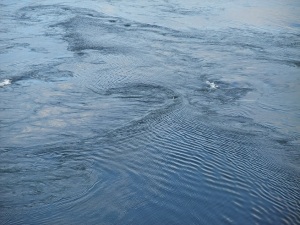My body was aching all over, but the worst about it was the feeling of complete exhaustion. The weakness. And the apathy.
I noticed it at work first. My wrists were stiff and hard to move, and every little tip and tap on the keyboard slowly became agony. My mind was foggy like I hadn’t slept for days. Like the moment when you are torn out of sleep by a fire alarm, brutally being forced to come to sense with reality, when your body is stuck in the first gear. But you are awake, and the days pass like strange dreams, but in this one you are forced to go through spreadsheets. One after the other, packed with last year’s stats and results. The fog was catching up with me.
Walking home, I could sense my weakness in every move, in my arms and legs. Lifting one leg up, I would place it in front of me, feeling my foot touch the ground. Heel to toe. It felt like my muscles had withered away, and my bones had become brittle and thin, just waiting to snap. I paid attention to my balance, my step, making sure that my leg was strong enough to carry my own weight before I attempted to lift the other one. Left, right, left, right. “Just 10 more minutes and you’ll be home. You can go to the supermarket when you feel better, today you don’t have to. Maybe get some takeaway. Indian perhaps?”. I was comforting myself. Or motivating? I don’t know really. I didn’t feel very motivated nor comforted, but I just wanted my bed, and my wonderfully soft duvet. A teleporter wouldn’t be so bad either.
My legs would amazingly enough carry my 125 lbs. up the stairs, all 86 steps. No takeaway weight included.
Actually, I was lying earlier. Mistaken. I didn’t notice it at work first. It was at home that the apathy settled and became part of my daily life. I didn’t want my bed because I was tired, but I needed to lie down. To sit, to consume, to not think. Thinking and learning were passions and my mind was like a sponge around knowledge. Now I couldn’t do it anymore. I embraced the fact that sometimes the best thing you can do is simply nothing, and I was getting good at it. But my 20 minutes of nothing turned into 40, then an hour, until my evenings were filled with foggy nothingness.
I did feel guilty about not doing anything. The kind of guilt that hides in your stomach as anxiety, gnawing on your insides, making you feel nauseous. Like the feeling before an oral exam. But my guilt was not strong enough to release me from my weakness or clear the fog. The kitchen was a mess. Stacks (well it’s generous to call them stacks, the constructive foundation of these stacks were clearly ones of the stereotype architect) of dirty plates and pots were filling the sink, and the stove had had to step up as the new kitchen work counter lately. The little stove that could. My washed clothes were hanging on the drying rack on the 3rd week now. A letter from the insurance company reminding me to send them a profile photo had been lying on the table for almost a month. Next to my laptop so I’d remember. Sure, I’ll do it tomorrow when I feel better. But I never did.
Luckily I didn’t have any new year’s resolutions. Only the general “start a new and better life” idea, with my minimalist approach to go through all my belongings, all my digital clutter, not to mention the emotional mess. The problem was that I didn’t have a plan. No passion. No motivation.
So I decided to stay at home and do nothing. The planned kind of nothing, based on my wish instead of my apathy. The doctor agreed. Sometimes doing nothing is just what you need. Sometimes doing nothing gives you more than any activity can. The good nothingness. Not the boring kind, not the exiting kind, and it’s definitely not bliss. But just right anyway.

Yes, it’s definitely a very different kind! And thank you, have a lovely day!